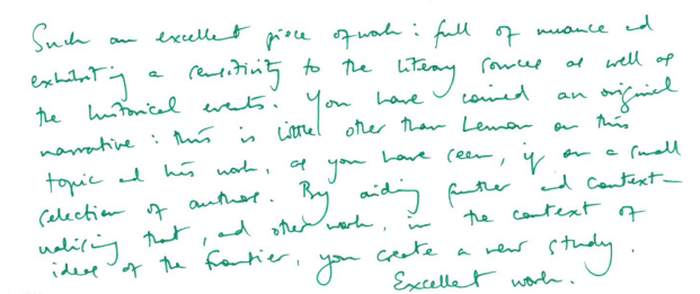Copycat don caught again
William O’Reilly claims the allegations form part of a homophobic bullying campaign

A Cambridge professor who kept his job despite “accidentally” copying a student’s essays faces fresh allegations of verbatim plagiarism dating back nearly two decades.
Dr William O’Reilly, an associate professor in early modern history, was allowed to return to his job last term after telling a University tribunal that he copied around 4,000 words of his student’s essays “inadvertently” and “in a situation of extreme personal difficulty”.
However, new evidence published to the academic portal PubPeer has revealed a pattern of verbatim plagiarism dating back to 2006.
Three different journal articles by O’Reilly – published between 2006 and 2016 – have been found to have large sections of verbatim overlap with uncredited sources.
In O’Reilly’s 2011 article ‘Movements of People in the Atlantic World, 1450-1850’, two pages appear to have been lifted almost directly from a 1995 article by Michael Heffernan. O’Reilly does not credit or cite Heffernan anywhere in the article.
More than a third of O’Reilly’s 2016 article ‘Non-Knowledge and Decision Making: The Challenge for the Historian’ similarly copies word for word the work of two other academic papers without acknowledgement.
O’Reilly’s article on ‘The Historiography of the Military Frontier, 1521-1881’ also borrows word for word from a 1973 article by Kurt Wessely without proper credit.
O’Reilly told Varsity he acknowledges the “great seriousness” of the allegations and claimed he has “never consciously sought to represent the work of others as mine”. He apologised that his acknowledgement of work was not to the standard it should have been, and claimed that one of the uncredited authors had accepted his apology.
O’Reilly believes these revelations form part of a wider homophobic bullying campaign against him, and that other academics would fall short if subjected to the same level of scrutiny. He claims that after the Financial Times first reported on the plagiarism of his student’s work, his car was vandalised outside his home.
Following a 2020 investigation into sexual assault hearings at Trinity Hall College, O’Reilly has been the subject of controversy. Tortoise, an independent news outlet, reported that O`Reilly had presided over the hearings into sexual assault allegations at Trinity Hall College while he himself had been accused of sexual assault.
O’Reilly has always strenuously denied the allegation and no further action was taken following a voluntary police interview.
The fresh plagiarism revelations have again raised concerns about the University’s internal disciplinary processes, which did not find O’Reilly guilty of intentional plagiarism in 2023 after he copied his student’s work.
The two-year investigation examined evidence that O’Reilly had praised and then copied two essays by one of his undergraduate students in an article for the Journal of Austrian American History.
While nearly half of the article had been lifted directly from the student’s work, the University ruled that the plagiarism had been the result of “negligent acts” and allowed O’Reilly to remain in post.
O’Reilly, who said he was “devastated to realise” his mistake, told the tribunal that he had only planned to use the student’s essays as an “aide-mémoire”. He said: “I firmly believe that I copied the material in my planning of the article, intending to use it only in a placeholding way, serving to remind me of the structure I planned to follow.”
The recent findings cast doubt on O’Reilly’s defence and put pressure on the University to reconsider the action taken against the professor.
O’Reilly provided the following abridged statement: “I draw your attention to the fact that this latest action to destroy me is but the latest in a series of such efforts. I wish to underline that I continue to be targeted by interested parties in Cambridge who seek to destroy me and to hound me out of the institution, who bully and harass and use others as proxies for these malicious actions, leaking, selectively, details of confidential material and briefing anonymously.”
“I have acted in good faith in all investigations and have abided by the findings of all processes. I greatly regret that I am restricted in what I can say and write at this critical time. I am in regular contact with my line manager at the Faculty, with colleagues and with senior members of the University with regard to these matters and I am awaiting further developments on this campaign against me and others.”
A University spokesperson said: “Any new allegations will be considered in accordance with University processes.”
 News / Uni Scout and Guide Club affirms trans inclusion 12 December 2025
News / Uni Scout and Guide Club affirms trans inclusion 12 December 2025 News / Pembroke to convert listed office building into accom9 December 2025
News / Pembroke to convert listed office building into accom9 December 2025 News / Cambridge Vet School gets lifeline year to stay accredited28 November 2025
News / Cambridge Vet School gets lifeline year to stay accredited28 November 2025 Features / Searching for community in queer Cambridge10 December 2025
Features / Searching for community in queer Cambridge10 December 2025 News / Uni redundancy consultation ‘falls short of legal duties’, unions say6 December 2025
News / Uni redundancy consultation ‘falls short of legal duties’, unions say6 December 2025









